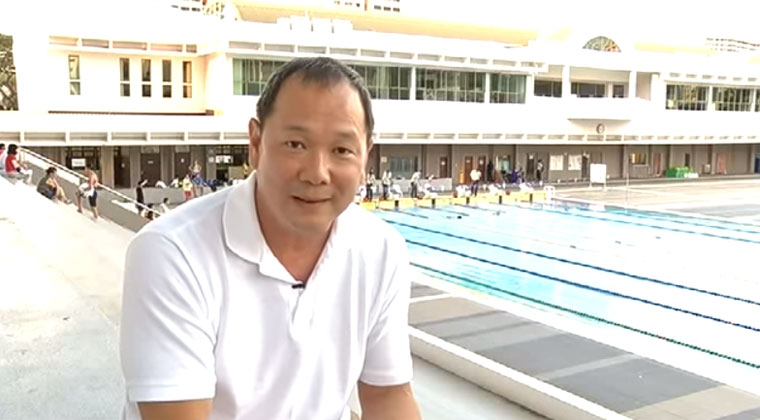What does winning an Olympic Gold mean? Or rather, what does knowing you had the chance to win it but didn't, really mean?
This:
Singapore's first swimming legend, Ang Peng Siong, once held the world number one ranking in the 50-metre freestyle in 1982.
In an video interview with Yahoo Singapore, published on Sept. 9, 2016, Ang talked about Joseph Schooling's Olympic win at Rio 2016, before being unable to continue as he was overwhelmed with emotion:
"Winning that Gold medal has always been something that personally I wanted for Singapore. And I think..."
Ang's show of emotion is understandable.
During his prime when his swimming physique and performance was peaking, the 53-year-old, who is now the founder of Aquatic Performance Swim Club, had to put his swimming ambitions aside to fulfill his National Service obligation.
That was an experience that broke him.
For the record, Ang's 50m freestyle 1982 record of 22.69 seconds stood as the Singapore national record for 33 years until Schooling broke it at the 2015 SEA Games.
That was when Ang was barely 20 years old then.
His tale of an almost-champion was recounted recently by Daniel Yun, who also talked about why Schooling's win was special to Ang.
It was revealed that Ang was pushed harder than other enlistees during NS because of who he was, but what was worst, was that the swimmer couldn't be exempted from NS fully to train for the sport many thought his body was made to excel in:
Peng Siong, I think, is happier for Schooling than many Singaporeans. He knows the sacrifice. But mostly, he knows the odds. His personal journey as an Olympian was, in his words, a painful experience. When he was 17 years old, he was the only Asian who made it to the finals of the 50m freestyle in Hawaii, the games organised by the Americans who boycotted the Moscow Olympics in 1980. He was then awarded a sports scholarship which based him in the Huston University. In the 1982 Asian Games in New Delhi, he won the gold in the 100m freestyle. At the Los Angles Olympics in 1984 he competed in the 100m freestyle, winning the ‘B’ consolation finals. He was ranked fourth in the World Swimming Championship in Madrid in 1986. Just when he was peaking, he was drafted into National Service at the end of 1986. He was physically fit for his Basic Military Training in Pulau Tekong but it was tough. When his fellow recruits were asked to do 50 pushups, he was asked to do 200 pushups. For someone who trained in water for years, the military exercises exerted a toll on his psychical being. In an 8km route march, he was down with heat exhaustion.
After BMT, he went on to train as a naval officer. Here he would collapse from pneumonia and was hospitalised, his body finally giving way to the months of accumulated military training. It was at this point that he asked to be deferred from National Service for the Seoul Olympics. He spoke to his Commanding Officer who tried to discourage him. On his behalf, the Singapore Amateur Swimming Association, SASA, appealed to Mindef, which conceded to a six-month deferment. He was sent along with a handful of swimmers for intensive training in the States. The Seoul Olympics in 1988 was especially significant because it was the first time the 50m freestyle was introduced in the Olympics. Ang Peng Siong would finally get a chance to compete in a swimming event almost tailored for his body. In the heats, he clocked a time which placed him in the ninth place. He had missed the finals by one place.
While a miss is as good as a mile and in the annals of Olympic history, there are many athletics with more compelling and heartbreaking stories, this missed opportunity was almost impossible for Peng Siong to bear. He broke down. And he would cry when he related this episode in his life. Now he has turned it around. On Saturday morning when Schooling won the gold, the first thought that crossed his mind was – it is about time! From 1998 to 2012, he was Singapore’s Swimming National Head Coach. Today, he lives a very disciplined life, to be physically fit to train his swimmers. The Straits Times ranked him fifth in the list of Singapore’s 50 Greatest Athletes of the Century. But it will be his personal experiences that Peng Siong will bring to bear. He believes every athletic wants to represent and make his country proud. Therefore every athletic with potential should be given a fighting chance.
According to Yun's blog post, Ang still believes the training of a winning Olympian would require at least two uninterrupted Olympic cycles and a Singaporean male can still serve National Service in his 30s.
Going by Ang's experience, Schooling's current exemption from NS was a path that was perhaps paved by Singapore's first swimming legend.
Related article:
Joseph Schooling is now Joseph Deferring NS Until 2020
Top photo via
If you like what you read, follow us on Facebook and Twitter to get the latest updates.
If you like what you read, follow us on Facebook, Instagram, Twitter and Telegram to get the latest updates.
